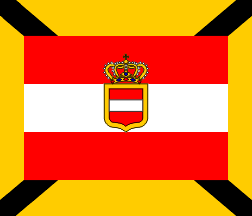 image by Željko Heimer,
16 October 2007
image by Željko Heimer,
16 October 2007
Last modified: 2014-04-12 by rob raeside
Keywords: pilot flag | austria | hungary | austro-hungarian empire |
tricolour:horizontal (red-white-red) | tricolour:horizontal (red-white-green) |
Links: FOTW homepage |
search |
disclaimer and copyright |
write us |
mirrors
See also:
With the increase of the shipping traffic it was soon realized that ships need
someone who is familiar with the treacherous local waters when entering foreign
ports and the pilot service was always a respected one in the maritime
tradition. In 18th century it was already custom adopted by the most merchant
navies for a ship entering a foreign port to hoist a special flag as indication
that she requires a pilot. These were as a rule the same in design to the
merchant ensign bordered with a white wide border. Mostly the pilot ship flew
the same flag as well.
The deviations from this pattern include borders
coloured in other colours, and the Austrian-Hungarian pilot flag is among the
most remarkable examples. With the advent of the wireless communication and the
adoption of the international signal code flags the need for a special pilot
flag decreased and into the modern times it has lost its meaning for the most.
The pilot flags for Austria-Hungary (Lootsenflagge) are reported in many
variations and there is hardly two contemporary sources that show the same
design. Here are presented the most typical variations in order that may
indicate the historical development of the flag. However, the full story of the
Austrian-Hungarian pilot flag is yet to be told.
Željko Heimer,
16 October 2007
 image by Željko Heimer,
16 October 2007
image by Željko Heimer,
16 October 2007
The Josephinian ensign of 1786 with a yellow border with a black saltire.
Source: Deppermann, Ruschke: "Flaggen-Almanach. Gesammelt, lithographirt,
gedruckt und herausgegeben im Lithogr. Institut von Deppermann & Ruschke",
Hamburg, 1844, pl. 22
Željko Heimer, 16 October 2007
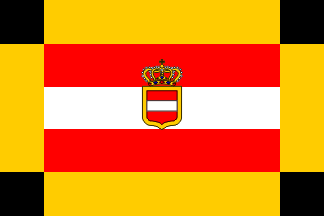 image by Željko Heimer,
16 October 2007
image by Željko Heimer,
16 October 2007
The Josephinian ensign with a yellow border and black square corner-pieces.
Sources: "Flags of Maritime Nations, from the Most Authentic Sources", U.S.
Department of the Navy, Bureau of Navigation, Washington, 1882, pl. 5
Ottfried Neubecker: "Fahnen und Flaggen. Eine bunte Fibel", L. Staackmann Verlag,
Leipzig, 1939, p. 91
Željko Heimer, 16 October 2007
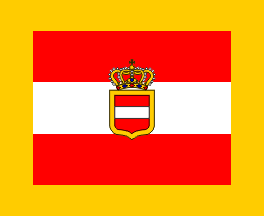 image by Željko Heimer,
16 October 2007
image by Željko Heimer,
16 October 2007
The Josephinian ensign with a yellow border.
Source: "Maritime Flags of All
Nations" flag chart, around 1870's?
Željko Heimer, 16 October 2007
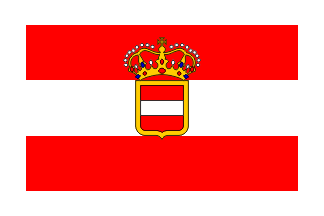 image by Željko Heimer,
16 October 2007
image by Željko Heimer,
16 October 2007
The Josephinian ensign with the crown reaching the stylized design formally
established only in 1896 with a white border.
Sources:
Hugo Gerard Ströhl:
"Oesterreichisch-Ungarische Wappenrolle", Anton Schroll, Wien, 1895, pl. 20
Friedrich Heyer von Rosenfeld: "Die See-Flaggen, National und Provincial-Fahnen
sowie Cocarden aller Laender", Verlag der kaiserlich-königlichen Hof- und
Staatsdruckerei, Wien, 1883, p. 2
Željko Heimer, 16 October 2007
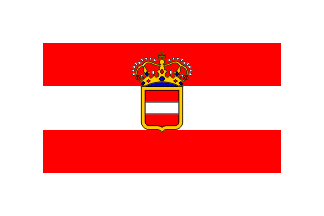 image by Željko Heimer,
16 October 2007
image by Željko Heimer,
16 October 2007
The flag with a white border matching the naval ensign design of 1896.
Source: "Dienst-Flaggen und Standarten der k.u.k. Kriegs-Marine, Wien 1896 (Nachtrag
1902)", reprint ca. 1990, Heeresgeschichtliches Museum, Wien
Željko Heimer, 16 October 2007
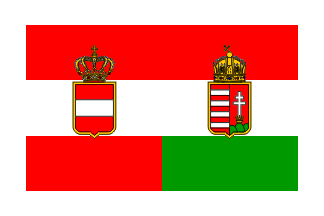 image by Željko Heimer,
16 October 2007
image by Željko Heimer,
16 October 2007
The "double" merchant ensign of 1869 with a white border.
Sources:
Hugo
Gerard Ströhl: "Oesterreichisch-Ungarische Wappenrolle", Anton Schroll, Wien,
1895, pl. 20
Moritz Ruhl: "Die Flaggen der Kriegs- und Handels-Marinen aller
Staaten der Erde in chromolithographischen Abbildungen", Verlag von Moritz Ruhl,
Leipzig, 1885, p. 7
Lt. Commander Byron McCandless, Gilbert Grosvenor: "Flags
of the World (Our Flag Number)", National Geographic Magazine, Vol-XXXII No-4
(1917.10), National Geographic Society: Washington, 1917, p. 347
Željko Heimer, 16 October 2007